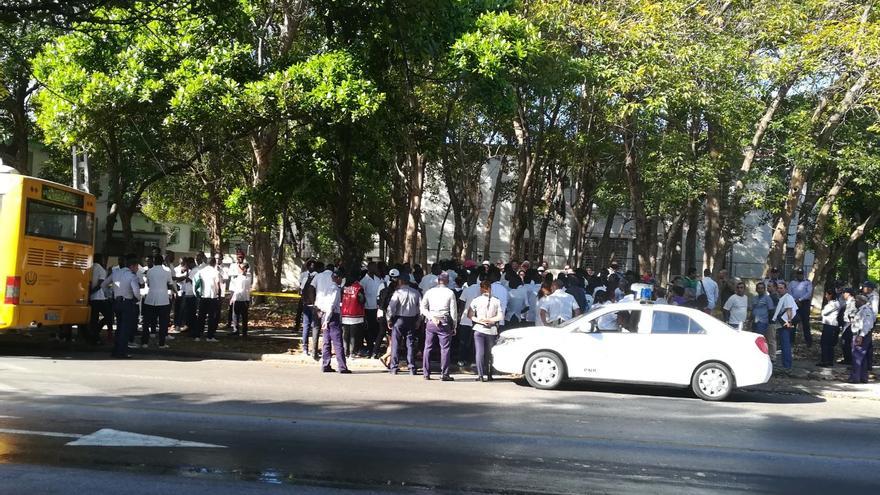
![]() 14ymedio, April 27, 2019 — Dozens of Congolese students who are studying medicine in Cuba find themselves being detained and guarded in a place close to the international airport in Havana, waiting to be repatriated to their country, according to several students who managed to remain in the Salvador Allende Faculty of Medicine in the Cuban capital.
14ymedio, April 27, 2019 — Dozens of Congolese students who are studying medicine in Cuba find themselves being detained and guarded in a place close to the international airport in Havana, waiting to be repatriated to their country, according to several students who managed to remain in the Salvador Allende Faculty of Medicine in the Cuban capital.
”They took them in a bus on April 18, and at first we thought it was for a meeting where they were going to explain things, but they never came back,” one of the students who remained on the university campus said, under condition of anonymity. “They’re not letting them speak with anybody, but we’ve learned that they are holding them in a well-guarded place to send them back to the Congo.”
“They carried out a raid at the Faculty of Medicine and put them on a bus,” the neighbors confirm. “All of us in the neighborhood thought that finally the situation was going to be managed because later we saw only a few buses return,” they add.
This newspaper can’t confirm if repatriation of the students has begun, but several sources said that they are awaiting “a response from the Congolese.”
Last Monday, an opposition group in this African country, in a comminication, had denounced the fact that the students were called to the Embassy of Congo in Miramar under the pretext that they were going to receive part of their overdue stipends. “Actually, the Cuban and Congolese authorities laid a trap for them,” the opponents explain.
“Shortly after they arrived, the students were separated into groups, and more than 200 were forced, by Congolese and Cuban agents, to get on the bus, supervised, and then were taken to an unknown stop. Other students waited more than 6 hours for their friends, without success. The telephones of the detainees had been out of service this whole time,” explains the text.
New images have come to light of the violent repression against students from Congo by the Cuban police. The student interns were protesting because of the delay of two years for their stipends and the poor conditions in which they are living on the island. Images here
— Mario J. Pentón (@marijose_cuba) April 9, 2019
The detention was also confirmed on the Facebook page, “I’m not returning without my diploma,” created by Congolese students to demand back-payment of 27 months of their stipends. On this platform, the students clarify that the protests that began at the end of March aren’t the work of a leader manipulated by “dark forces” as claimed by the Congolese Government.
The group of medical alumni also said that they presented legal remedies in agreement with Cuban law, and they launched a petition to the authorities on the island to allow release and academic reinstatement of the detainees.
After this happened, the Chancellor of Congo, Jean-Claude Gakosso, went to Havana, where he met with Miguel Díaz-Canel and presented him with a letter from the Congolese President, Dennis Sassou Ngueso. However, the official press only mentioned the visit as an opportunity to strengthen commercial and political ties.
Junior Bokaka, a Congolese student of epidemiology, who has been featured as one of the protest’s spokesmen, said on Facebook that the complaint about the stipends for the Congolese students has “nothing to do with the Cuban Government.”
Bokaka took advantage of the opportunity to point out that, contrary to what some press media have said, he is a simple student who reported the situation on his Facebook account, but he doesn’t consider himself a leader of the demonstrations nor a student representative.
Translated by Regina Anavy
_______________________________
The 14ymedio team is committed to serious journalism that reflects the reality of deep Cuba. Thank you for joining us on this long road. We invite you to continue supporting us, but this time by becoming a member of 14ymedio. Together we can continue to transform journalism in Cuba.
